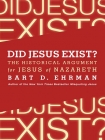Did Jesus Exist? - The Historical Argument for Jesus of Nazareth Bart Ehrman (books to read in your 20s txt) 📖

- Author: Bart Ehrman
Book online «Did Jesus Exist? - The Historical Argument for Jesus of Nazareth Bart Ehrman (books to read in your 20s txt) 📖». Author Bart Ehrman
Eventually some Christians came to think that Jesus must have been the Son of God not only during his public ministry but for his entire life. And so they began telling stories about how he was born as the Son of God. We find this view in Matthew and Luke, where Jesus’s mother is in fact a virgin so that he is in a more literal sense the Son of God because the Spirit of God is responsible for making Mary pregnant (see Luke 1:35).
As time went on, even this view failed to satisfy some Christians, who thought that Jesus was not simply a being who came into the world as the Son of God but someone who had existed even before being born. This is a view not suggested by either Matthew or Luke (they appear to think that when he came into existence at conception). And so we come to our final canonical Gospel, the Gospel of John, which indicates that Jesus is the Word of God who existed with God from eternity past, through whom God created the world, who has now become a human (John 1:1–18). But I need to stress: this is a view found only in our last Gospel.17 It eventually became the standard view among Christians and was written into Christian statements of faith: Christ is himself God. But it was not the earliest Christian view, not by a long shot. Christians, then, did not invent Jesus as a dying and rising god. In the oldest form of the faith they did not consider him to be God. That belief developed only later.
Instead, as we have seen, the earliest Christians considered Jesus to be the crucified messiah. Even though Jesus is never explicitly called God in any of our early Gospels—or in the traditions they were based on or even in Paul—he was almost everywhere called something else. He was called the Christ. Even the Philippians hymn, Paul tells us, is about “Christ Jesus.” So frequently was Jesus called Christ in the oldest Christian traditions that already by the time of Paul, “Christ” had become Jesus’s name (Jesus Christ, not Jesus God). Jesus is called Christ in Paul, Mark, M, L, John, Josephus, Pliny, Tacitus, and so on. It is important to remember what this term meant in ancient Judaism. It referred—however it was interpreted—to a future powerful deliverer of God’s people from their enemies.
And so the key question to ask of the early traditions is not why the earliest Christians called Jesus God (since they didn’t), but why they called him the Christ. He was, after all, known by everyone to have been crucified, and the messiah—whatever else you might say about him—was not supposed to be crucified. Just the opposite. The early Christians did not ask why God had been crucified. They asked why Christ had been crucified. They did not derive the ideas of Jesus’s death from pagan myth. They knew he had died, and they believed, in Jewish apocalyptic fashion, that he had been raised. But the fact that they called him the Christ shows they did not derive the ideas of his death from Jewish legend and myth either since Jews had no conception of a crucified messiah. Thus the conclusion that has been reached by historians far and wide appears to be the right one: Jesus must have really existed and must have really been crucified. Those who believed in him thought that he was the messiah anyway. And they redefined what the term messiah meant in order to make sense of it. They did not invent the idea of Jesus, however. Had they done that, they never would have invented him as a crucified messiah. They were forced to come up with the idea of the crucified messiah because they knew there really was a man Jesus who was crucified, yet they wanted to maintain that he was the messiah.
And so Jesus was not invented as a Jewish version of the pagan dying and rising god. There are very serious doubts over whether any pagans believed in such gods. Few scholars wonder if Jews believed in them, however. There is no evidence to locate such beliefs among Palestinian Jews of the first century. But even more important, Christians did not see Jesus as a dying and rising god because they at first did not even see him as God. The divinity of Christ was a later theological development. The earliest Christians saw him as a dying and rising messiah.
Was Jesus Invented as a Personification of Jewish Wisdom?
NO ONE HAS BEEN a more enduring spokesperson for a mythicist view of Christ than G. A. Wells. For over thirty-five years Wells has insisted that the Christ of Christian tradition did not exist but was invented. He does not think, however, that the majority of mythicists are right that Christ was invented as a Jewish version of some pagan dying-rising gods. In his opinion the myths used to generate Christ were Jewish. Specifically, Christ was created as a personification of the mythical figure known in Jewish texts as “Wisdom.”
As we will see in greater detail later, Wells also disagrees with most other mythicists because he thinks that there really was a man Jesus. But for Wells, Jesus had very little, or nothing, to do with the myth about Christ. He was not the Galilean preacher and healer of the first century. That figure is the creation of the Gospel of Mark. Jesus was a completely unknown and obscure Jewish figure who lived over a hundred years earlier. Christ, by contrast, was an invention of a Jewish sect of the first century.18
In rough outline this view is similar to that earlier held by Archibald Robertson, who suggested the following: “May not a solution of the dispute [between those who insist that





Comments (0)